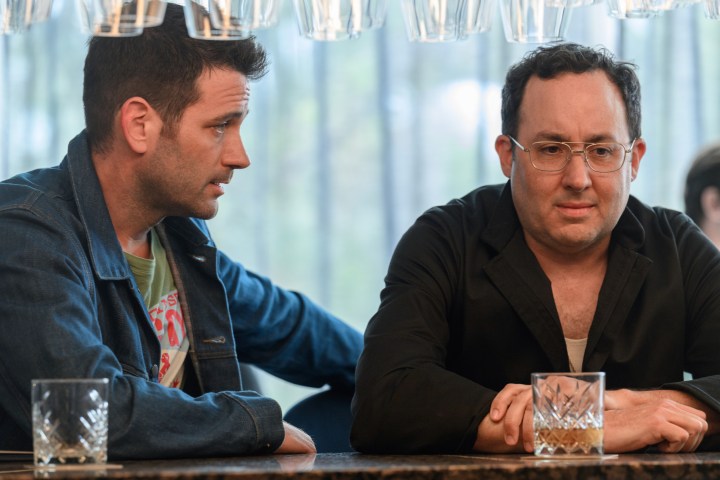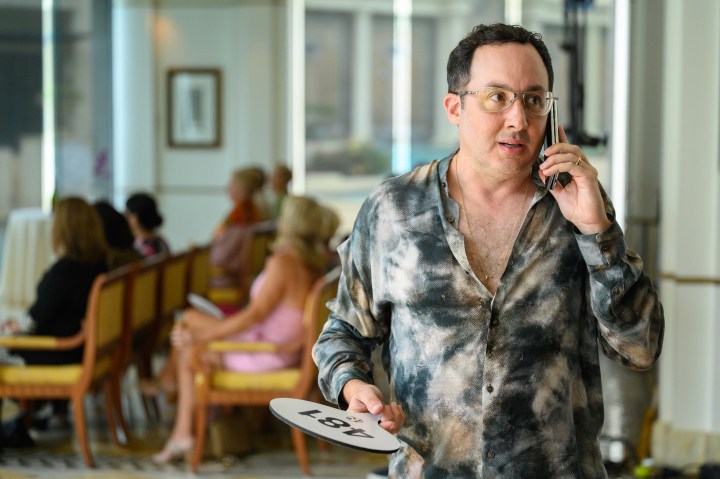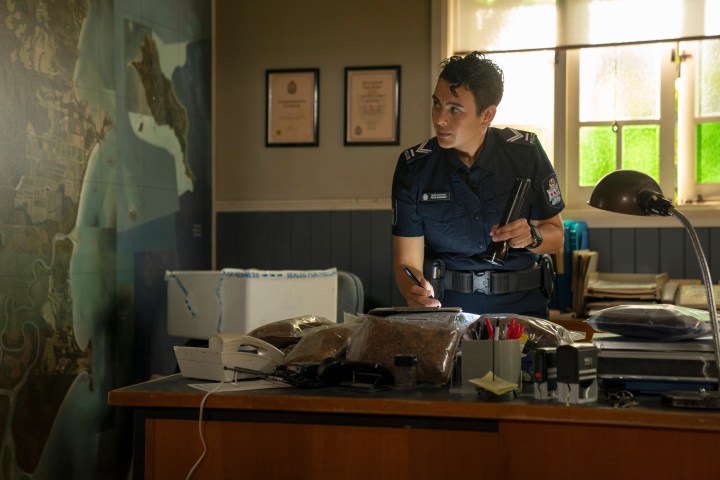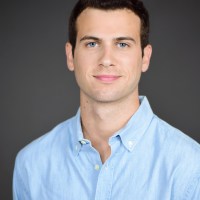In Irreverent, Paulo Keegan (Colin Donnell) is on the run. As a criminal mediator for the mob in Chicago, Paulo kills a member of the mafia, forcing him to flee the country. At a bar, he meets Reverend Mackenzie Boyd (P.J. Byrne), a clergyman who recently learned about his wife’s plans to divorce him. After their chance encounter, Keegan finds a way to hide by impersonating the reverend in a tiny beach town in Queensland, Australia. As “Mack,” the mob fixer attempts to keep a low profile, but the bizarre townspeople force Mack into action as he slowly integrates into their culture.
Created by Paddy Macrae, Irreverent is a fish out of water dramedy about the power and importance of community. In addition to Donnell and Byrne, the cast features Kylie Bracknell, Briallen Clarke, Tegan Stimson, Ed Oxenbould, Wayne Blair, Russell Dykstra, Calen Tassone, and Jason Wilder. Andrew Knight, Debbie Lee, and Alastair McKinnon will executive produce the project.
In an interview with Digital Trends, the cast and executive producers of Irreverent discuss the dynamic between Paulo and Mackenzie, Piper’s motivations throughout the series, the pressure of finding a global audience, and the authentic portrayal of contemporary Australian life.

Note: This interview has been edited for length and clarity.
Digital Trends: Paddy, you’ve been working on this project for a long time. What was the original idea that got the ball rolling?
Paddy Macrae: That’s right. It’s been a long process. I wrote and directed a student film pilot at a film school in 2010, so it actually existed as a TV series in some form for 12 years. But, the origin story goes back a lot further than that, to when I was born. I’m a “PK,” preacher’s kid. I was born and raised in a church in a small house with my mom and my dad, who’s a reverend himself, [and] my sisters and my brother.
I was brought up in a world where the community came first, people came first, and our house was basically the town hall. Anyone could walk in. Everyone had keys to the house, which my mom hated, but it was the truth. People would come in with their problems, victories, celebrations, and losses. It was a bit like a sitcom set in a house.
You never knew who was in the spare bedrooms. It was absolutely wild. When I got into TV in a professional sense, I wanted to create a story that encapsulated all the beauty and the heartache and the joy and the laughter and the happiness of the community. But I wanted to give it a TV twist and give it a big premise.
My parents were always people first, love first, and community first. They were rule breakers. They were they were protesters. I thought, “What if we had someone who could really break the rules? What if we took a criminal who had never set foot in a church and put him in a position where in order to stay alive, he had to perform and pretend to be someone good? And in doing so, became someone good.”
I remember walking out of the pitch the first time and Debbie said to me, “It’s not Breaking Bad; it’s Breaking Good.” That was the pitch. I think it came from a very personal place. We put a TV spin on it, put it in a place I hope people want to go to, tropical Far North Queensland. What I think we’ve done is create a really surprising, beautiful show.

I like how the lines are blurred with these characters, as you don’t know if they’re good or bad. I don’t think Mackenzie is bad, but he’s done some questionable things. When you were reading the script, what stood out about Mackenzie?
P. J. Byrne: Well, I just like meeting a character, literally from the moment you meet him, who is an absolute crisis. For someone who’s done the right thing his whole life, found God, found the woman he loved, [he] thought that would be his path, literally to the day he died. When his wife tells him she wants a divorce right at the airport, it throws him for a loop. A crisis of love, a crisis of faith, and at that moment, he’s lost.
When he meets Paulo, he sort of lays it out to him that there is no God. If you see something, take it. He’s going to think this is his destiny. This is his fate. So he takes $1.6 million from that man. He’s going to live large, and he’s going to see the world in a way he never has before and hopefully find himself. But, is money the answer? Is materialism the answer? Tune in on Tuesday night. I have no idea what night we start. [Laughs] November 30th, you’ll find out!
Piper is a smart, suspicious cop. She’s also dealing with her own problems as she returns home from the city. What do you think Piper is trying to accomplish back in this town?
Kylie Bracknell: I think she’s regrouping deep in her soul, actually. She’s connecting to family again and her high school sweetheart, Aidan. But she slipped back into something that’s quite complacent, and I don’t think it’s quite comfortable for her because she’s not a complacent person by any means. She set out to be highly successful in her career, which is being a cop or detective, so she’s not going to let that slide.
She wants to stay on top of things in town. The town’s a bit boring until this new reverend comes along, who looks disheveled and not quite like a reverend at all. It’s definitely something for her to focus on, and she does, probably in more ways than she should. She’s got her eye on him for sure.

The dynamic between Mackenzie and Paulo is very interesting. It’s like an odd couple as they both rely on each other. P.J., how did you form a relationship with Colin? How was it playing off of each other?
Byrne: Well, there’s something really lovely for any job you do. You have to show up on set. If you’re going to be a buddy to another actor, you have to form an instant bond. You have to have it literally from day one. It’s a wild scenario that you’re thrown into. First and foremost, you have to like that human, which helps a lot, I’ll tell you. Thank God I love Colin.
These two characters, the way they’re working, he’s got to teach me to be more of a man on some level, and I’m going to teach him on some level to have more of a heart. But really, you’re going to find out that they existed in each other on their own if you will. We’re gonna grow together and find the goodness ideally in each other.
Debbie, can you speak to Colin and P.J.’s relationship? How was it watching their journey together?
Debbie Lee: Look, when we went through that casting process, as it was a very long process, both Colin and P.J. very quickly stood out as people who could inhabit those roles and bring something else to it. As we were watching rushes coming through day by day, it was like, “Oh, wow. This is really going to work.” I
It was a tricky balance because P.J. is a larger-than-life character whereas Colin is much more grounded. Seeing those rushes coming in like, “OK, this is going to be fine.” It was a bit nerve-racking going into it because you never quite know what you’re walking into. But seeing the cuts come in, it’s been fantastic. They’ve just brought so much to, both of those actors.
Macrae: I took P.J. and Colin out for dinner the first time they were both in Mission Beach. We went and got a burger on the beach, the three of us. I remember sitting there, and they just started talking. I could have just left. They wouldn’t have even noticed. I thought, “We’ve got this.” It’s perfect. We’ve got the yin and the yang. They were their characters.
Kylie, what were your conversations with Paddy like when building your character of Piper?
Bracknell: Did I have any conversations with Paddy Macrae? I don’t think there was any stone left unturned. We talked about everything. So many things when it came to Piper. He’s been sitting with this for over a decade. It’s his baby. Thank goodness he did. Apparently, Piper started out in a couple of different career titles. I think at one point, Piper was going to be a lawyer, so still involved with the law somehow. But yes, we had numerous conversations about Piper. The depth of how lovely the tapestry of her trajectory has been and will be. Many conversations I’m trying to remain elusive. Is this working? [Laughs]
We did have lots of conversations about how we wanted to make sure that there was a groundedness to her that sits right in the pocket where she needs to be. Some stuff went down in the city for her. Returning home to connect back to her country, back to her family in this quirky town with these cool people who have a mixed bag, which I love. I love seeing that, especially for Australian content. She definitely wants to achieve more. She’s a high achiever, and I hope she gets there.
Irreverent was shot in Australia. It will air on Netflix Australia and on Peacock in the United States. Alastair, does this present a new set of challenges or added sense of pressure as the show tries to find a global audience?
Alastair McKinnon: Look, I think that you always feel a sense of pressure with anything that you make. I think the stakes are certainly higher going out, particularly on an American platform like Peacock. That sort of feels like the Holy Grail in many senses. It’s a country that has so much content. It’s such a robust industry, and there are so many choices. It’s exciting to be a part of that and to be part of that offering and, hopefully, people find us and watch it.
It’s always a challenge when you’re dealing with networks and buyers and talent and directors. All of the various people come into a show, and they’re all bringing different perspectives. It’s corralling all of those different views and trying to keep a straight line through the show that you’re setting out to make while juggling all of those different opinions.
I think one of the really heartening things with this is we were making it really for a global audience. Hopefully, this is universal, and the themes of connection and community are things that everybody can relate to.
But fundamentally, we do really want to connect with that Peacock audience, which is America. Happily, the Peacock execs, who have been so wonderful and so supportive throughout, really got it, so it’s actually been a very harmonious and smooth creative process, which it isn’t always. I think we got really lucky with the team at Peacock. It feels like the right home for it.
Lee: They totally backed us every step of the way and were additive, which was wonderful.

This show is so many genres wrapped into one. It’s a fish-out-of-water story. It’s a crime story. It’s funny. Ultimately, what do you think is the heart of the story?
Byrne: That’s a great question. First and foremost, I liked that you gravitate towards that, because just as actors, at least for me, I like showing the totality of a character, the heart, and the humor. My favorite show ever is M*A*S*H. It’s wildly funny. It’s wildly heart-wrenching. It’s very intense. You love that whole team, but ultimately, it’s about community. Every house has a problem, and if you come together as a community you can really solve that problem.
I think one of my favorite African proverbs is, “If you want to go fast, go alone; if you want to go far, go together.” I know we’re sort of in COVID and sometimes we’re still alone. I just hope that people can also watch this show and feel like we’re in it with them as well.
I think people will be able to connect with this messy and charming town because of the authenticity it gives off. Paddy, what message were you trying to convey about contemporary Australian life?
Macrae: Well, I think messy is a great word for it. I think life is messy. What we wanted to communicate was even though life is hard, even though life is messy, look at the state of the world today. The world is hard, and the world is messy and dark, and broken. There is all this difficulty in it. There is always hope. There is always hope that if we can connect with each other, [and] if we can do things for each other and come together, that’s a message that certainly transcends any organized religion, any business, any organization.
If we, as human people, can come together and ultimately put people first, that is essentially what it is to be human. Human is connection; human is community. The town is a mess, I hope, in all the right ways, just like the planet is a mess. The people are a mess, too. They’re broken, but they have beauty, and they have hope. The light can overcome the dark when the right ingredients are in place. I don’t want to make it sound like it’s a rose garden. There’s lots of suspense. There are car chases. There are bad guys. There are motorbikes.
McKinnon: There are guns.
Lee: There are baddies.
Macrae: There are baddies. There are gangsters. Ultimately, I hope that people will walk away from this show feeling challenged and learning something about themselves by watching a group of authentic people on-screen.
Irreverent premieres on Thursday, November 30 on Peacock. All 10 episodes will drop at once.



